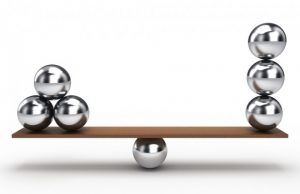
Let's start by noting that range balance it's not all or nothing. The "range" intervals you use don't have to be perfect, and they certainly don't have to be in the perfect proportion we mentioned in the last article. Let's talk about imperfections. In a real poker game, the information that you use in your hands is very, very slow for your opponents to get. Think about it - they see one hand in a showdown, and most hands in poker are not even opened. What's more, it takes time for an opponent to see a hand that reveals a lot of really unique information about your game. Thousands of hands may pass before he sees a hand again that confirms or denies his original information. Most of the range of hands you use will be unknown for a long time because this information is gathered very slowly in real poker, so you can do whatever you want until your opponent figures out what's going on and reacts accordingly.
It's not just information that is imperfect in poker. People also like to react to imperfect information. For example, even if your opponent catches you bluffing, you don't have to prove to him that you have a strong enough hand to make him respect you again. Showing that you have a few is usually enough. If your opponent suddenly sees a nut in an unusual situation where you were bluffing during a showdown, he will no longer catch you in that situation, because he will conclude that you have adjusted your game and your range in that situation, and you will no longer bluff. Strong conclusions of this type are often drawn from such, vivid, observations. Instead of thinking: "Yeah, I saw a nut once, and the other eight times it was a bluff, so his range is 89% bluffs", the opponent will think that you've completely changed your strategy. He will then need to see a significant number of hands to make sure that he does not have enough nuts in his range to make him unplayable. This is not only due to vague and slow information, but also because vivid situations (such as seeing a strong card) are more memorable than slow data.
Very often, in order to balance their range, players make the big mistake of thinking that the other player thinks the same way as they do. Even that they see the whole situation the same way they do. This is one the biggest mistakes a poker player can make and for which he refuses to call profitable bluffs.
For example, let's say we are in a situation where we are considering doing the following: 3 but a bluff on the river, showing a runners-runners line, which is off-centre. When considering such a bluff, you may realise that you would never have had a line here because you would have played differently from the start. You might also start to think that it's irrational, because that's not the way to play with a queue at all. That's the mistake of thinking that the other player sees things through your eyes. The point is that even if he thinks the same way as you, he cannot know if you always play the backdoor queue this way. He may not have had a chance to analyse such data about your game at all. Or better still, maybe he didn't even notice when such information was right in front of his nose, maybe he saw it but forgot it. There are many stages of information gathering between what you notice and what another player notices. You have to remember this, otherwise you will lose a lot of profitable situations just asking for a bluff.
There are important and obvious exceptions to this rule, where the insurmountable balance between "unexploitable" and "perfect" is important. These are situations where information retrieval is unstable and very fast. For example, in any location close to the centre, such as preflop 3bet, you can't get away with 3betting with a bad hand. Your opponents will pick up on this behaviour and react very quickly. But the further away from the centre you are, the harder it is to get information, which makes it harder to react quickly, and also adds more psychological subtleties, making you less visible and harder to exploit.





